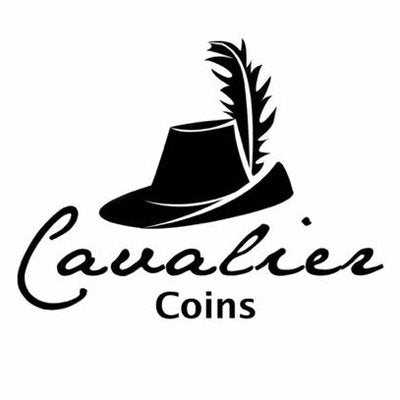That forgotten jar of coins sitting on your shelf holds more power than you might realise. When you donate coins to charity, you're turning what feels like small change into serious funds that fuel vital missions all across the UK. It’s a beautifully simple, yet surprisingly powerful, way to make a real difference.
The Hidden Power of Your Spare Change
It’s all too easy to dismiss the shrapnel in our pockets or that ever-growing coin jar as insignificant. For UK charities, though, these small contributions are a genuine lifeline. When you add up the spare change from thousands of supporters, it creates a powerful stream of income that can fund everything from local community projects to massive national campaigns.
The collective impact is what's truly staggering. Think of it this way: a single pound coin might not feel like much, but when it joins thousands of others, it pays for essential services. It's one of the most accessible ways to give, making it a truly democratic form of fundraising.
Why Coin Donations Still Matter
Even as we move towards a more cashless society, physical coins and cash hold a special place in charitable giving. For many people, dropping a few coins into a collection tin is a simple, spontaneous act of kindness. This is especially true for those spur-of-the-moment donations at shop checkouts or local community events.
Charities working on causes like animal welfare, health research, and children’s services often count on these small, frequent contributions. The steady flow of these donations provides a predictable income, which is crucial for planning their work effectively.
The real value isn't in any single coin, but in the collective spirit of giving. Every donation, no matter its size, joins a larger pool of generosity that allows charities to keep doing their essential work.
The Scale of Small Change
We see the power of collective giving prove itself time and time again. A recent two-year partnership with the Bank of England, for example, raised an incredible £225,093.45 for three major UK charities. A significant part of this came from initiatives that encouraged small-scale giving, often through coin donations at fundraising events.
You can see a full breakdown of this inspiring effort on the Bank of England's charity page. It really shows how our individual contributions build into something huge.
Knowing how to donate your coins effectively can make your generosity go even further. To give you a better idea of your options, here’s a quick look at the most common methods available.
Quick Guide to Coin Donation Methods
| Donation Method | Best For | Key Consideration |
|---|---|---|
| Supermarket Kiosks | Large, mixed collections of coins you've saved up. | Machines often take a small commission, but the convenience is hard to beat. Check which charities are supported. |
| High-Street Banks | People with a specific charity in mind who prefer a direct transaction. | Some banks offer coin deposit machines for customers or have direct partnerships with charities. |
| Charity Shops | Smaller bags of change and anyone wanting a personal touch. | Always a welcome donation. It's best to pop in during quieter hours if you have a large amount. |
| Collection Tins | Spontaneous giving when you're out and about. | The classic method. Look for sealed, official tins to ensure your money goes to the right place. |
Ultimately, choosing any of these simple methods ensures your spare change gets to work quickly, supporting the causes that matter most to you.
How to Prepare Your Coins for Donation
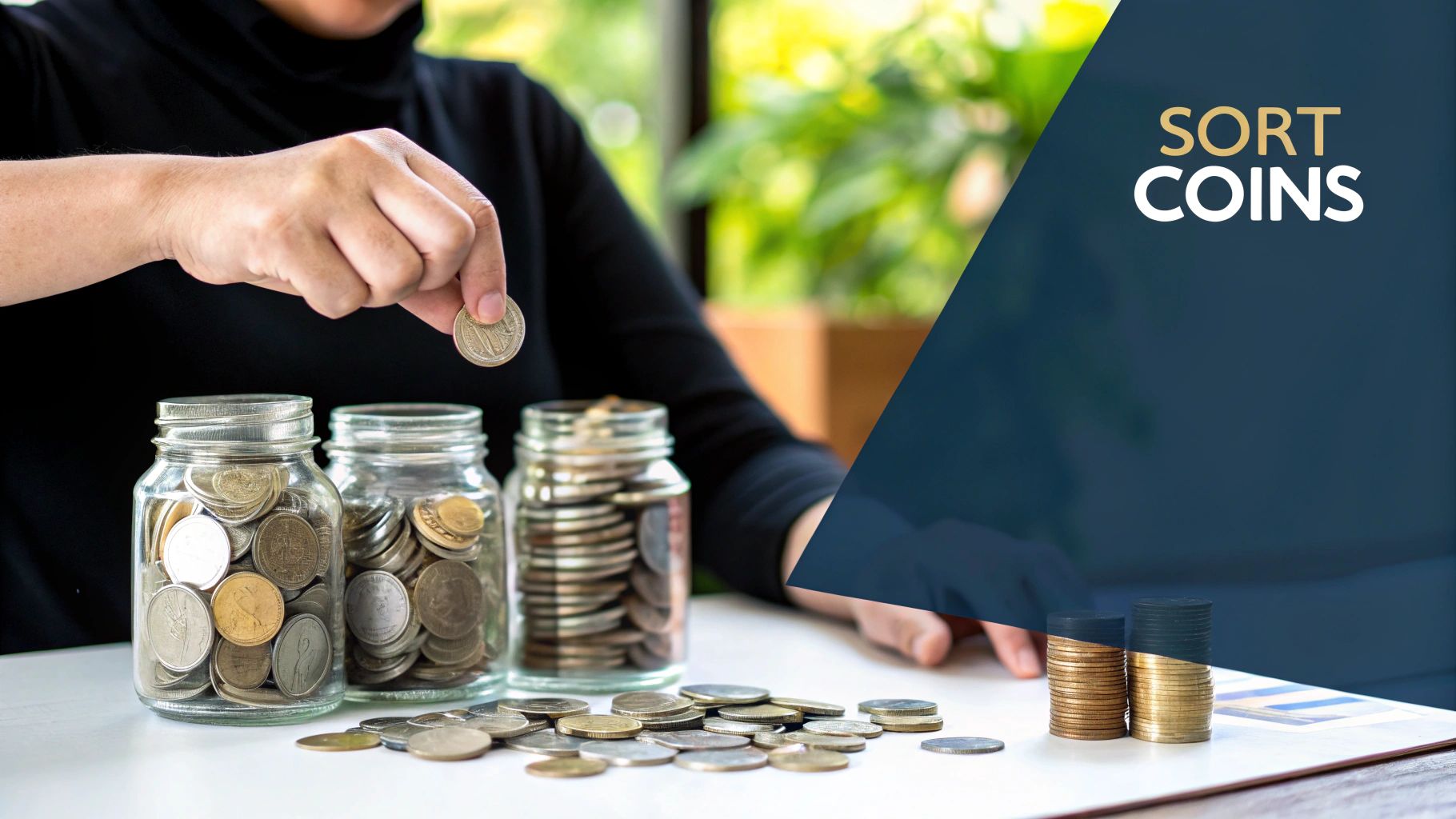
Before you hand over that heavy jar of coins to a charity, a few minutes of prep work can make a world of difference. When you take a moment to organise your donation, you’re saving the charity precious time and administrative effort. This means more of your money goes directly to the cause, which is what it's all about.
If your coins are particularly grubby, a quick clean is a considerate touch. Charities certainly don't expect pristine currency, but removing any obvious dirt or sticky residue is always appreciated. For anyone dealing with very old or tarnished pieces, you can find good advice on how to clean dirty and rusty coins to get them in the best possible shape.
The single most helpful thing you can do is separate the coins by denomination. Just picture a volunteer faced with a single, heavy bag of mixed coppers, silver, and pound coins—it’s a tedious job. By putting your 1p, 2p, 5p, and other coins into separate, clearly labelled bags, you make the whole process much smoother for them.
To Roll or Not to Roll
A question I hear a lot is whether it’s helpful to roll coins in those paper wrappers you get from the bank. It seems like the right thing to do, but it isn’t always helpful. Many larger charities and banks now use high-speed machines to count coins, and those machines need loose change. Forcing a volunteer to sit there unwrapping dozens of rolls can actually create more work.
Pro Tip: The easiest way to know for sure is to just ring the charity shop or branch you plan to visit. A quick phone call to ask, "Do you prefer coins rolled or loose?" gives you a clear answer and shows you're thinking about their process. If you’re ever in doubt, keep them loose but separated by denomination.
Handling Foreign and Old Currency
It's almost a guarantee that any old change jar will have a few foreign coins from past holidays or some old UK currency that’s no longer in circulation. Don't just toss them out—they often still have value!
Many national charities have programmes specifically for this kind of currency. They work with specialist companies that can consolidate and exchange huge volumes of foreign and obsolete coins, turning them into vital funds.
Here's the best way to handle them:
- Separate all foreign and old coins from your standard UK change.
- Put them in their own bag, clearly labelled something like "Foreign/Old Coins".
- Check with major charities like Oxfam, The Royal British Legion, or the RSPCA, as they frequently run active campaigns for these specific types of donations.
Taking these simple steps ensures your donation is as easy as possible to process, maximising its impact the moment it leaves your hands.
Finding the Right Charity for Your Coins
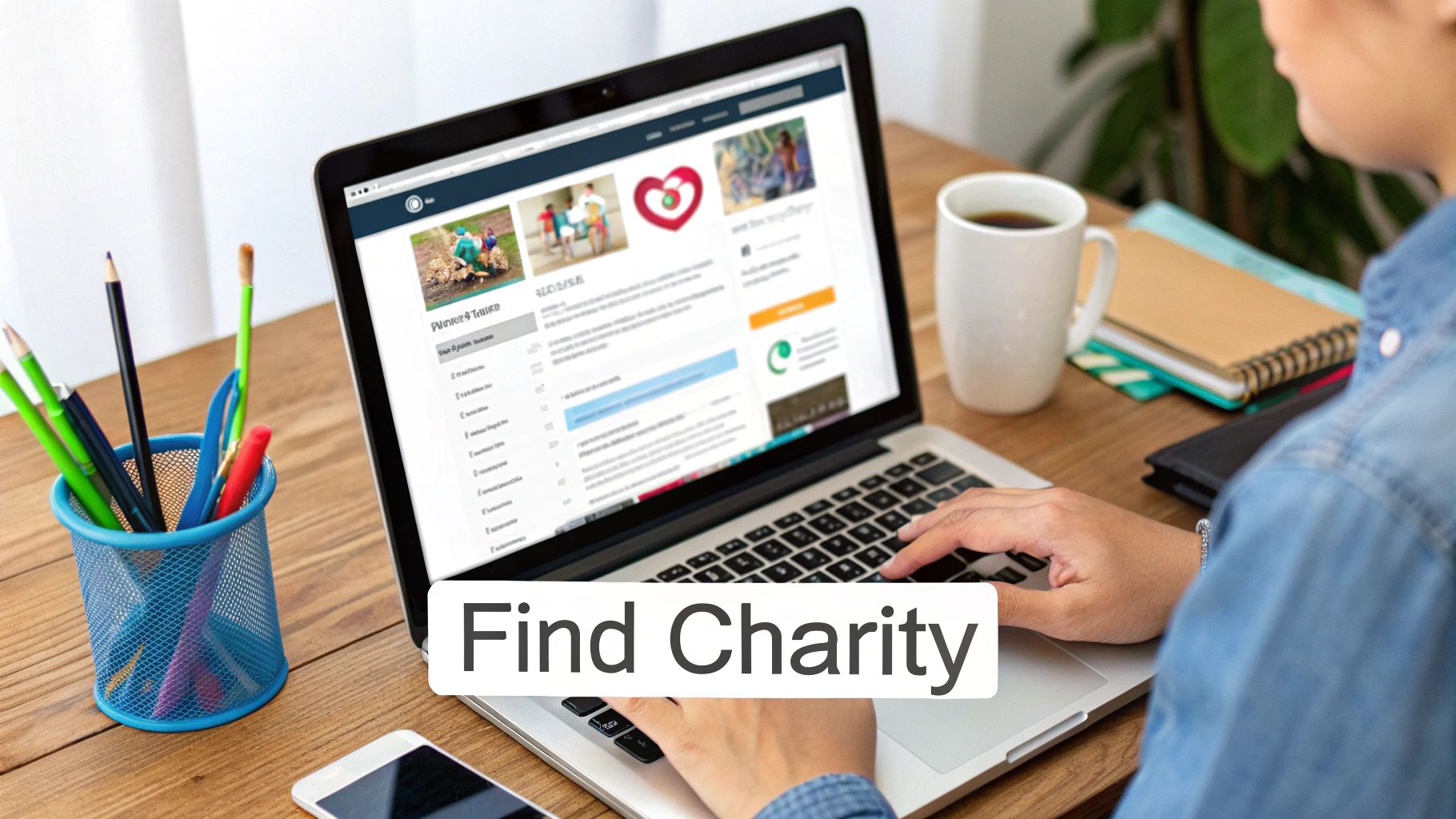
Deciding where to direct your donation can feel like a big responsibility, especially with so many worthy causes out there. The great thing is that the UK has a deeply ingrained culture of giving. In fact, total charity income recently hit around £96 billion, a significant jump from previous years, proving that every single contribution, no matter the size, really does add up. You can see more details on UK charity sector performance over at policybee.co.uk.
This generous spirit means you have plenty of fantastic charities to choose from. The trick is finding an organisation that doesn't just resonate with your personal values but is also properly equipped to handle coin donations. A little bit of thoughtful research ensures your generosity makes the biggest impact possible.
Research and Verify Your Chosen Charity
Before you hand over your hard-saved coins, it’s always a good idea to do a bit of homework. Your first stop should be the Charity Commission's official register. It’s a free online tool that lets you search for any UK charity and confirm its legitimacy in moments.
Once you’ve found a charity on the register, you can look into its financial history, its stated mission, and the people behind it (the trustees). This gives you complete peace of mind, confirming your donation is going to a genuine, regulated organisation that’s open about how it operates.
A quick glance at their latest financial reports will show you exactly how they use their funds, which is incredibly helpful for making an informed choice.
National versus Local Organisations
One of the first decisions you'll likely face is whether to support a large, national charity or a smaller, local one. Both have their own distinct advantages, and the best choice really depends on what you hope your donation will accomplish.
- Large National Charities: Big names like the British Heart Foundation or Cancer Research UK often have brilliant, well-oiled coin donation schemes. They have the national infrastructure to collect and process huge volumes of coins from all over the country, turning loose change into serious funding for vital research and support services.
- Smaller Local Charities: On the other hand, donating to a local food bank, animal shelter, or community centre can create a more immediate and visible impact. Your contribution might directly help to buy food parcels for families or fund a specific local project you can see making a difference in your own neighbourhood.
I’ve found that one of the best things to do is simply pick up the phone. Calling your local charity branch with a question like, "I have a big jar of coins I'd love to donate; what's the best way for me to get them to you?" can start a great conversation and give you all the clarity you need.
Aligning With Your Values
At the end of the day, the most rewarding way to give is to support a cause you're truly passionate about. What matters most to you? Is it animal welfare, environmental conservation, supporting the elderly, or children's health? Pinpointing your core values will help you narrow down the field considerably.
Once you have a cause in mind, you can search for charities working in that specific area. Many will say right on their websites if they actively welcome coin donations. And don't forget to keep an eye out for any potentially valuable coins in your collection. If you think you might have something rare, our guide on seven tips for buying collectable coins can help you learn what to look for.
Choosing a charity that aligns with your passions makes the act of giving that much more meaningful.
Your Practical Options for Donating Coins
Right, you’ve sorted your coins and picked a charity. The final piece of the puzzle is actually getting the money to them. Luckily, there are a few really straightforward ways to donate coins to charity here in the UK, and which one you choose really just comes down to what's easiest for you and how much you've collected.
It’s fascinating to see what’s happening with charitable giving in the UK. There's a clear trend of 'fewer people giving more'. Even though the total number of donors has dipped since before the pandemic, overall donations recently hit a massive £13.9 billion. Small change donations are a huge part of this, especially for local, grassroots causes. You can get a deeper dive into these charitable giving facts and insights at CharityDigital.org.uk.
This little guide breaks down just how simple it is to get your coins from a dusty jar to a place where they can make a real difference.
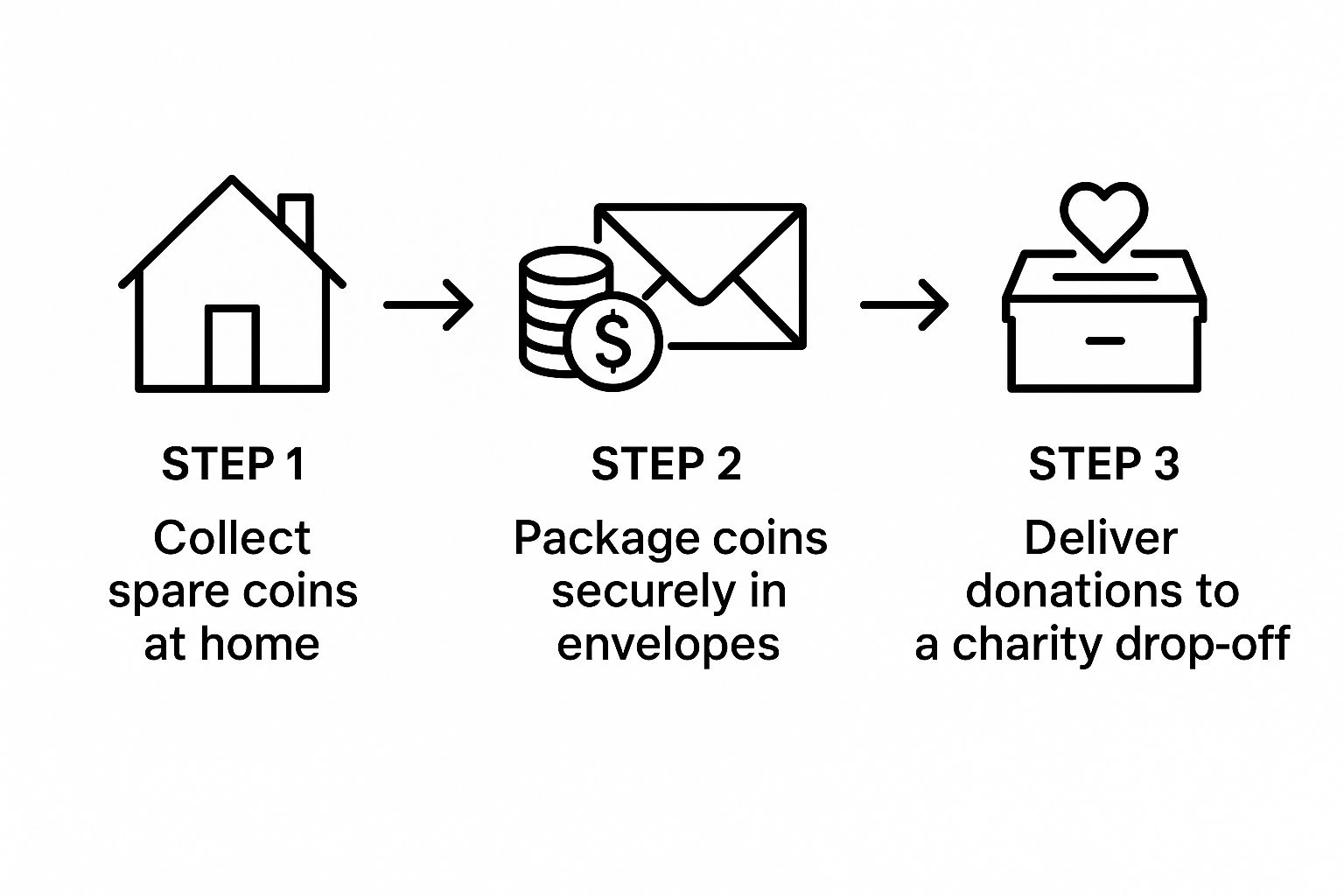
As you can see, it boils down to three simple actions: collect, package, and deliver. It’s an easy and accessible way for absolutely anyone to chip in.
Dropping Off at a Charity Shop
This is probably the most direct and personal way to do it. Just take your bags of sorted coins straight to your chosen charity shop. You get to hand them over to a real person, and it’s a great chance to have a quick chat about the work they do. It really helps connect you to the cause.
This method works best for small to medium amounts of coins. If you’ve got a particularly hefty collection, it’s always a good idea to give the shop a ring beforehand. A quick heads-up helps them prepare and makes sure there’s someone there who can give you a hand.
Using Supermarket Coin-Counting Machines
Got a huge, heavy jar of mixed coins? The automated machines you see in the big supermarkets are a total godsend. Kiosks from providers like Coinstar let you pour your whole hoard in at once, saving you the headache of sorting and counting everything yourself.
It’s dead simple:
- Pick your charity from the menu on the screen.
- Tip your coins into the tray.
- The machine does the maths and prints a receipt with your donation code.
One thing to be aware of: these machines are incredibly convenient, but some do take a small cut as a service fee. The good news is that many will waive the fee completely if you choose to donate the full amount directly to one of their partner charities.
Official Collection Tins and Buckets
You can’t beat the classics. That collection tin on the corner shop counter or the bucket held by a volunteer on the high street is still a cornerstone of UK fundraising. It’s perfect for those spur-of-the-moment donations, letting you get rid of your pocket shrapnel for a good cause.
When you donate this way, just make sure it’s legitimate. A proper collection tin will be sealed and should clearly show the charity's name and its registered number. This is your guarantee that your money is going where you intend it to.
Donating Through Your Bank
Some of the big UK banks have set up their own schemes with charities to make coin donations easier. This could be through their own coin deposit machines in-branch or as part of specific fundraising drives they run throughout the year.
It’s worth checking with your own bank to see what they offer. This can be a very secure and efficient way to pass on your donation, especially if you’ve already banked the coins and just want to transfer the total to an organisation. Each of these methods is a safe and effective route for turning your spare change into genuine support.
Boosting Your Donation with Gift Aid
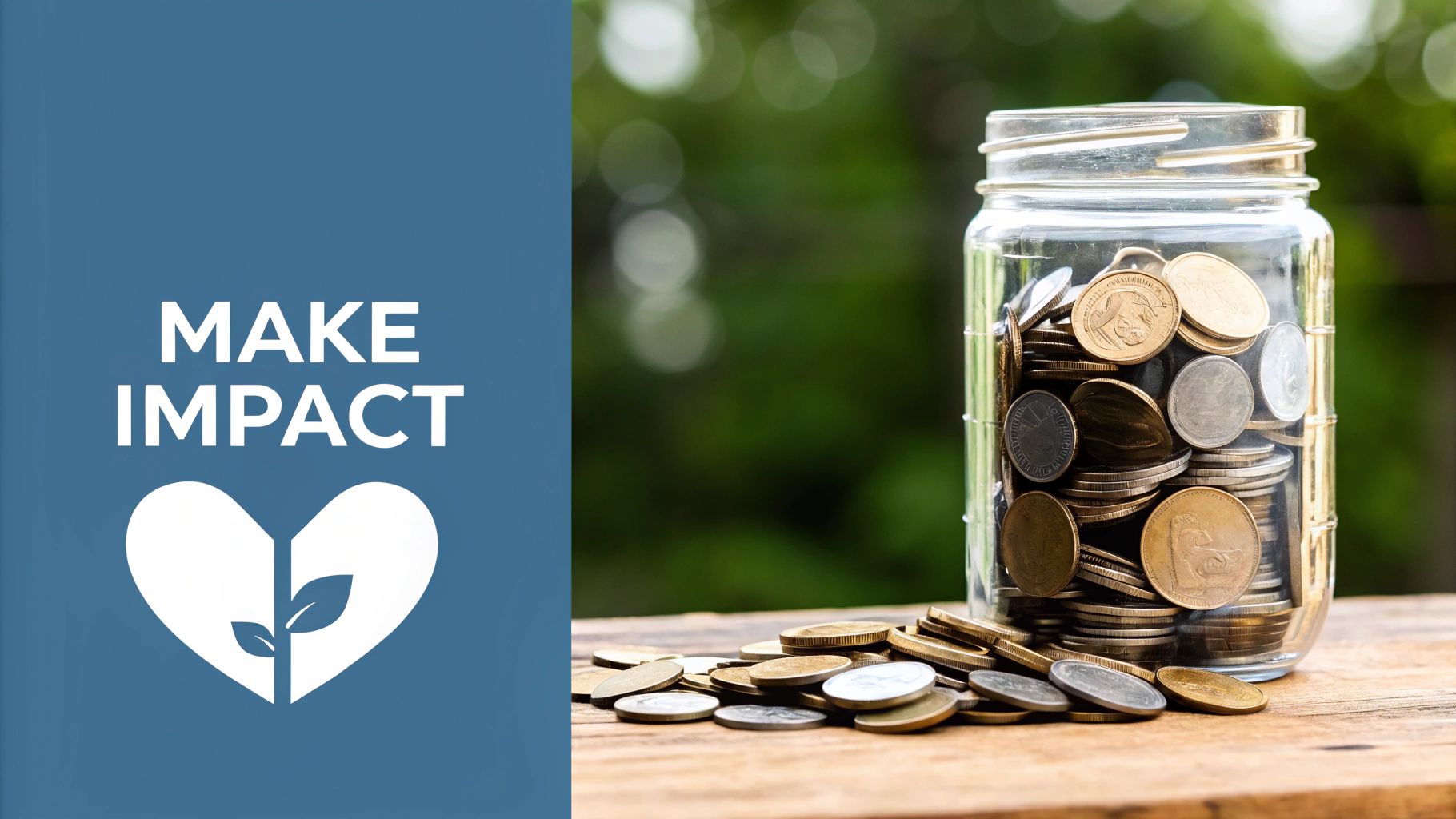
What if you could make your generous coin donation 25% bigger without it costing you a single extra penny? It sounds too good to be true, but that’s exactly what Gift Aid does. This fantastic UK government scheme allows registered charities to claim back the basic rate tax you’ve already paid on your donation.
It’s surprisingly simple. For every £1 you give, the charity can claim an extra 25p straight from HMRC. This small step can dramatically increase the impact when you donate coins to charity, turning a £10 coin donation into £12.50 for a cause you care about.
Who Is Eligible to Use Gift Aid?
To make a Gift Aid donation, you just need to be a UK taxpayer. The key rule is that you must have paid at least as much in Income Tax or Capital Gains Tax during the tax year as the amount of Gift Aid that will be claimed on all your donations. It doesn't matter if you're employed, self-employed, or receiving a pension; as long as you've paid enough tax, you're good to go.
This is why charities will ask you to fill out a quick declaration form. It’s your official confirmation that you are a UK taxpayer and you’re happy for them to claim the extra funds on your donation.
Making a Gift Aid Declaration for Coins
When you pop into a charity shop or office with your sorted coins, just let a staff member or volunteer know you'd like to Gift Aid the donation. They’ll have a short form for you to complete, either on paper or a tablet. This is the Gift Aid declaration.
Typically, you'll need to provide:
- Your full name and home address, including the postcode. This is crucial for the charity to identify you as a current UK taxpayer.
- The name of the charity.
- Confirmation that you want to apply Gift Aid to this donation and any future ones you make.
By simply filling out this form, you give the charity permission to boost your donation significantly. It’s a one-time process for most charities and makes a massive difference to their fundraising totals.
Common Questions and Misconceptions
One of the most common points of confusion is whether you can Gift Aid anonymous cash donations, like dropping a few quid into a collection tin on a shop counter. The answer is generally no. Because the charity can't link the donation back to a specific taxpayer, they can't make a claim.
This is why dropping your coins off directly at a charity shop is so much more effective if you want to maximise your contribution. It gives you the chance to complete that vital declaration.
On a related note, if you suspect some of your coins might be rare or valuable, it’s always worth getting them checked. You can learn more with these expert coin collection valuation tips for UK coins, as a high-value piece could be a significant donation in its own right. Taking five minutes to sign a form is one of the most powerful and simple ways to support your chosen cause.
Got Questions About Donating Coins? We’ve Got Answers
Even with the best of intentions, it’s natural to have a few questions before you hand over your hard-earned change. You want to make sure your donation makes the biggest possible impact, and getting the details right is a big part of that. We hear a lot of the same queries, so we’ve put together some straightforward answers to help you give with confidence.
Let's clear up some of the common sticking points, from what to do with old holiday money to making sure a collector is the real deal. Once these are sorted, you can focus on what really matters: supporting a cause you care about.
What Should I Do with Foreign or Old UK Coins?
It happens to everyone. You empty your coin jar and find a random assortment of old holiday money, pre-decimal coins, or outdated £1 coins. Don't just toss them out! Many larger charities are experts at turning this seemingly useless shrapnel into vital funds.
How do they do it? They often work with specialist exchange companies that process huge volumes of foreign and obsolete currency.
Your best bet is to pop these coins into a separate, clearly labelled bag. Then, just ask your chosen charity if they can take them. Big names like Oxfam, The Royal British Legion, and many animal welfare charities frequently run campaigns specifically for foreign currency, making them a great place to start.
Should I Roll My Coins or Keep Them Loose?
This is the classic question, and honestly, the answer depends entirely on the charity. It might feel helpful to neatly roll up your coins in those paper wrappers from the bank, but sometimes it just creates more work. Many charities use high-speed counting machines that need loose change, meaning a volunteer has to sit there and unwrap every single roll you’ve so carefully prepared.
On the other hand, a smaller, local charity that counts everything by hand might be incredibly grateful for the help.
The Best Approach: The simplest and most thoughtful thing you can do is give the charity shop or local branch a quick ring. A two-minute phone call to ask what they prefer shows you’re thinking about their volunteers' time. If you can’t call ahead, the safest bet is to keep your coins loose but separated by denomination into different bags.
How Can I Tell if a Charity Collection is Legitimate?
It’s absolutely crucial to know your donation is safe and going to the right place. When you see a collector on the high street or in a shop, there are a few key things to look for.
- Official ID: Street collectors must carry formal identification and should never have a problem showing it to you.
- Sealed Tins: Collection tins and buckets have to be sealed to prevent anyone from tampering with them.
- Clear Branding: The container should clearly display the charity's full name and its registered charity number.
If you have any doubt at all, trust your gut. It’s always safer to hold onto your donation and give it directly through the charity's official website or by popping into one of their shops. That way, you have total peace of mind that your money is going exactly where you intended.
At Cavalier Coins Ltd, we know just how much value can be locked away in donated coin collections. We actively purchase bulk coins from charities, helping them transform their supporters' generosity into the crucial funds they need to continue their work. If your organisation is looking for a trusted partner to handle its donated coins and banknotes, find out more about what we do at https://www.cavaliercoins.com.
